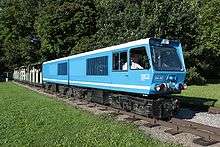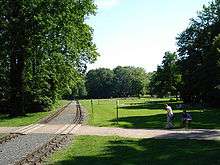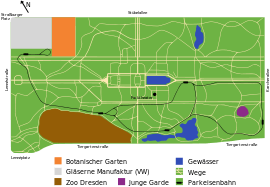Dresden Park Railway
The Dresden park railway (German: Dresdner Parkeisenbahn) is a 381 mm (15 in) minimum gauge railway in Dresden, Germany. The line opened in 1950 and was previously known as the Kindereisenbahn and the Pioniereisenbahn. As these names suggest, the line is largely operated by children, and is a survivor of the many children's railways that were built in the former Eastern Bloc countries.
| Dresden park railway | |||
|---|---|---|---|
 Steam locomotive 003 (Moritz) | |||
| Overview | |||
| Type | Light railway | ||
| Locale | Dresden | ||
| Stations | 5 | ||
| Operation | |||
| Opened | 1950 | ||
| Operator(s) | Staatliche Schlössen und Gärten Dresden | ||
| Depot(s) | at Station Zoo | ||
| Technical | |||
| Line length | 5.6 km (3.5 mi) | ||
| Track length | 7.2 km (4.5 mi) | ||
| Track gauge | 381 mm (15 in) | ||
| Operating speed | 20 km/h (12 mph) | ||
| Route number | 12249 | ||
| |||


Operation
The railway operates within the Großer Garten, a large city centre park, from April to October. It is some 5.6 kilometres (3.5 mi) long and attracts approximately 250 000 visitors every year.[1]
The line starts from An der Gläsernen Manufaktur station, which takes its name from the adjacent Gläserne Manufaktur, a Volkswagen car factory. From here to Zoo station the line is double track, and served by trains in both directions. Zoo station takes its name from the nearby Dresden Zoo and is the headquarters of the line, with locomotive and car sheds. Beyond Zoo station, trains normally operate on a one-way single track loop via stations at Carolasee, Karcherallee and Palaisteich, before returning to Zoo station. A shorter loop is also available that omits Karcherallee station, but this is rarely used.[1]
The park railway has four locomotives. Of these, two are nearly identical steam locomotives built in 1925, numbered 001 (Lisa) and 003 (Moritz). There are also two battery electric locomotives with EA01 built in 1962 and EA02 built in 1982. The locomotives haul 35 passenger cars and a number of ancillary vehicles.[2]
Trains are run by a team of, in 2009, 165 children together with four full-time adult employees and some 50 seasonal and part-time staff. During the winter months, the children are trained in their tasks for the forthcoming summer.[1]
History
The railway was founded in 1950 as the Kindereisenbahn with only one track, 1.3 kilometres (0.81 mi) long, between Zoo and Stübelplatz (which later became Fučíkplatz and then later still Straßburger Platz). The railway was planned to only last for a year, but it was kept and renamed Pioniereisenbahn in 1951. The line was owned by Dresden City Council, but operated by the pioneer movement.[3]
In 1951 the track was extended to 4.4 kilometres (2.7 mi) running from Zoo via Carolasee and Palaisteich back to Zoo. Later in the same year the station Karcherallee was opened and the line reached its current length of 5.6 kilometres (3.5 mi). In 1968 an additional track was added between Zoo and Fučíkplatz.[3]
In 1990, after German reunification, the railway was renamed as the Parkeisenbahn. In 1993, ownership of the line was transferred to the state of Saxony. In 2000, the construction of the new Gläserne Manufaktur meant that the station at Straßburger Platz had to be relocated. The new station was opened in 2000, and subsequently renamed An der Gläsernen Manufaktur.[3]
See also
References
- "Parkeisenbahn - Interesting facts" (PDF) (in German). Castles and Gardens Dresden. Archived from the original on 2009-11-22. Retrieved 2010-05-04.
- "Parkeisenbahn - Vehicle overview" (in German). Castles and Gardens Dresden. Retrieved 2010-05-04.
- "Parkeisenbahn - History" (in German). Castles and Gardens Dresden. Retrieved 2010-05-04.
External links
| Wikimedia Commons has media related to Dresdner Parkeisenbahn. |
